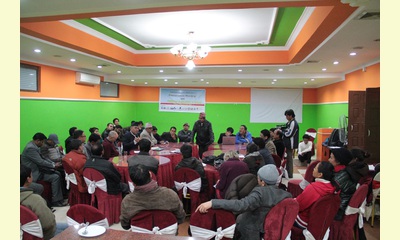|
|
Nepal: Freedom of belief should be equally enjoyed for both majority and minority religious groups
un article par Prakash Khadka
A consultative meeting was organized by a coalition
of more than twenty civil societies in Kathmandu.
Around forty leaders from Hindu, Christian and
Bahai, educators expressed their concerns about
policy and legal provisions regarding religious
freedom in Nepal. The rights to freedom of practice
of the religious minority are being challenged due to
the wider cultural practices influenced by the
majority religion. 
Discussion on religious rights being held in Kathmandu
click on photo to enlarge
"Art and cultural practices are constraining religious
rights" said Mr. Lok Mani Dhakal; a member of
Constitutional Assembly. “The republic system itself
is not in favour of minority because of the two-thirds
voting provisions”- he added.
Mr. Raju Pradhan, a Nepali Christian professional
presented a paper about the religious issues and
constitutional/legal provisions for freedom of belief
and practice. Mr. Pradhan focused on the 23rd
clause of the Interim Constitution of Nepal-2007
which he considers to be a double standard as it
guarantees the religious freedom at the same time as
it limits freedom of choice as follows: Every person
shall have the freedom to profess and practice his
own religion as handed down to him from ancient
times having due regard to traditional practices.
When a child grows up to a certain level of maturity,
he/she should have freedom of choice of choosing
or not choosing a belief regardless of what has been
handed down from ancient times.
Participant also discussed some difficult cases when
some government agencies conduct mass practices
of Hindu customs as if mandatory for all regardless
of their individual faith.
According to Mr. Narendra Pandry, a member of the
interreligious council of Nepal from the Bahai faith,
burial grounds, legality of religious property and
government recognition of vital registrations in
religious institution are still major concerns for
religious rights and identities.
Non-Hindus are not allowed into some of the famous
Hindu shrines where millions of funds are collected
from thousands of non-Hindu tourists every month,
said Ms. Debaki Acharya who is a Hindu by faith and
leader of a civil society organization. “How can be a
public religious place be banned for people from a
certain faith?” she questioned.
The demand of rights for a religious minority should
be accompanied by fulfillment of civil duties. Some
of the Christian leaders during the discussion
emphasized that legal provision of punishment for
killing a cow is right and just since the cow is a
National Animal in Nepal. One should not make it
issues of religious freedom and therefore protect its
national identity.
“But it is not enough to have only legal provisions;
the attitudes of people have to be changed and for
this a constructive role of media is imperative”- the
parliamentarian added.
Nevertheless, religious rights are not only for a
minority religion, they should be equally enjoyed by
the religious majority too.
Nepal looks forward to a long-awaited new
constitution as deadline of constitution assembly is
23rd January, as mandated by second election of
constitution assembly in 2013. The first election of
constitution assembly was held in 2008 but was
dissolved in 2012 without progress.
Also, Nepal is going through the second cycle of
Universal Periodic Review by the Human Rights
Council of United Nations in November 2015.
|








|
DISCUSSION
Question(s) liée(s) à cet article:
Freedom of religion, how can it be ensured?
* * * * *
Commentaire le plus récent:
This question refers to the article Nepal: Freedom of belief should be equally enjoyed for both majority and minority religious groups by Prakash Khadka.
Readers' comments are invited.

|
|









